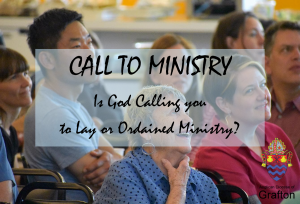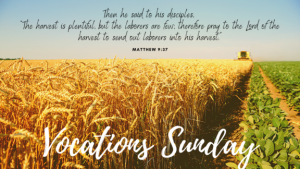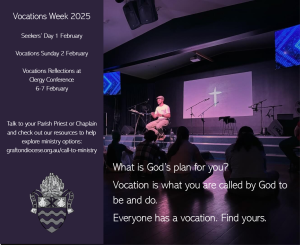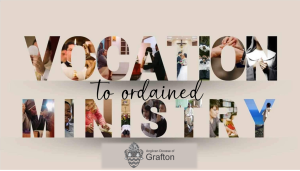God calls everyone to serve, bringing the love of God into people’s lives and reflecting Jesus’ servant ministry to others.
Some have a further calling – to serve God and all people through the Church’s ordained ministry or through one of its licensed lay ministries. For this particular calling, it isn’t enough simply to be convinced yourself that you have a vocation. You have to allow your sense of vocation to be tested by the Church through its discernment processes. It is the Church that validates and authorises that calling.
In exploring whether you are called by God to ordained ministry, or to some licensed lay ministries, you will probably be asked to meet a number of people to help you to discover whether you show signs of having a vocation to ministry.
When reflecting on what God might be calling you to, there is a lot to think about but these three things are particularly important:
- Do you have an internal sense of call?
You may have a strong inner conviction that God is calling you. How you experience that conviction will vary. It might be a nagging feeling over time that will not go away. It might come as a bolt out of the blue that this is what God’s will is for you. However you experience the call of God, it is likely to be persistent and will not go away. Your sense of calling needs to be tested by the Church.
- Has your sense of call been recognised by others?
If you feel a sense of call, it is a good idea to share it with your priest, chaplain, your family and friends – those you can trust – to see whether they can see God’s calling in you. Those who know you well will be able to be honest about whether they can see you in this role. They may have spotted it a long time ago and are waiting for you to recognize it for yourself!
- Is your sense of call realistic and informed?
It is important to have some understanding of the expectations and demands that will be placed upon you if you are to fulfil your vocation. You need to have some understanding of what is involved in mission and ministry in a changing society and the kind of tasks that you may be called upon to undertake.
What could I be called to?
Licensed Lay Ministry
After local discernment and a course of part time study (such as Education for Ministry or similar) candidates may be licensed by the Bishop to conduct ministries in their parish or district. Licensed Lay Ministers (LLMs) have a leadership role serving alongside clergy to support people in faith and enable mission. LLM ministry looks different in different places depending on the local context. Many LLMs teach, preach, lead worship and are involved in mission. Some also take funerals after additional training. LLM ministry is unpaid, so many carry out their church ministry at the same time as having another job.
Licensed Lay Minister Mission Statement
Across the Anglican Diocese of Grafton, this place of slow rivers, ancient volcanoes, farmland and wild coastlines, there are people responding creatively to God’s mission.
Like yeast in a good sourdough, like seashells on a sandcastle, Licenced Lay Ministers are the life and soul of the Anglican Diocese of Grafton.
We are passionate about the Church, its message and its people, and so commit to leadership and pastoral roles in our Anglican communities. We support the church and wider communities by sharing the love of Jesus Christ in worship and in pastoral care. We listen, we pray, and we use our gifts in practical service – walking daily alongside our people, through hardship and with joy.
The role of Licenced Lay Minister is a meaningful and rewarding response to a sense of vocation which is formally endorsed by our parish communities, the diocese and the Bishop.
Ordained Ministry – Priests
Priests are disciples of Jesus Christ, who love God and neighbour, and are filled with an infectious and life transforming faith. They lead through prayer, teaching, and worship, enabling God’s people to be better disciples of Christ. Priests preside at Holy Communion, baptisms, weddings, and funerals, walking alongside people in their joy and in their grief. They are committed to the mission of the Anglican Church, working with others to build up the Church through recognising where God is at work in the world and in the lives of others. Some ordained ministers are paid (Stipendiary). Others offer their ministry in a voluntary capacity.
Ordained Ministry – Distinctive Deacons
Deacons are outwardly looking and community minded. They prefer to be out and about, building relationships, identifying and meeting needs, and creating stepping-stones between the church and the wider community. As ambassadors, deacons take the gospel into the community, bringing its needs back to the church for intercession and practical action. Deacons read the Gospel, assist the priest, encourage intercession, and send out the congregation, going with them as we all play our part in God’s mission.
Pioneer Ministry
Pioneer Ministers, who can be Lay or Ordained, challenge and lead the church into new forms of ministry and mission by engaging creatively with local communities. Pioneers must be able to see a new future, and have the skills and gifts needed to make the future accessible now. Pioneers connect with those outside the Church, working alongside them to create fresh expressions of Church in those places. Pioneers are leaders of innovation, with a gift for seeing what God is doing and responding creatively to it.
Religious Life
Members of a religious community, such as monks or nuns, live according to the gospel of Christ with prayer as a regular part of daily life. In most communities, promises are taken or vows made in community before God and the church. Such vows include poverty, chastity, and obedience. Usually, but not always, vows are made for life. Some wear distinctive clothes (a ‘habit’). Some are engaged in the world, others are more oriented to prayer. Members of communities can be lay or ordained. In Grafton Diocese our two Religious Communities are the Community of the Sisters of the Church (CSC) at Kempsey and the Little Brothers of Francis at Tabulam.
Discernment Process
As you try to discern what it is that God may be calling you to, it’s important to consider all the possible options. The selection process for those offering to train for the ordained ministry, for example, unlike any normal recruitment process. It is best seen as a time of discernment, and is therefore more like a journey or pilgrimage than an examination. A call to Ordained or Licensed Ministry has been described as the coincidence of a person’s gifts with the church’s needs, informed and illuminated by the Holy Spirit. The Grafton process seeks to discern whether the enquirer’s sense of call is obedient, realistic and informed, and whether they have the necessary gifts and capacities to exercise a ministry of leadership in the Church at this time and in this Diocese. Your starting point is to meet with your own Rector, Chaplain, or equivalent, to talk with them about your sense of calling. You should also arrange to meet with the Ministry Development Officer. It is important that you continually pray about your vocation throughout the discernment process.
At the very heart of this calling is the seeking of God’s will and trying to put yourself completely at the disposal of God.
Enquiries regarding Training & Ministry should be directed to:
The Venerable Tiffany Sparks
Ministry Development Officer
Anglican Diocese of Grafton
Office: 02 6642 4122
Email: archdeacon@graftondiocese.org.au
The Bishop talks about Vocation
Resources for Vocations Week 2025
View Resourses for Vocations Week 2025Resources from previous years
View Resourses from previous yearsWelcome Screen Vocation Sunday
Alternative Intercessions and Prayers for Vocation Sunday
Additional Resources for Vocations Sunday





